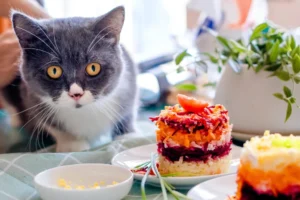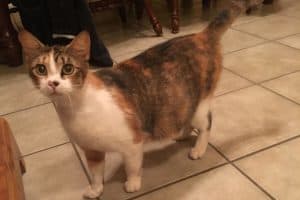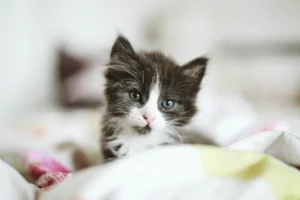Have you noticed that your cat is constantly begging for food, even after being treated for worms? This behavior can be puzzling and concerning for pet owners. Let’s explore why your cat may still seem hungry even after worming.
When a cat continues to display excessive hunger after being wormed, it could be due to a variety of reasons. However, one common explanation is that the worms may have caused damage to your cat’s intestines, leading to malabsorption of nutrients. This can result in your cat feeling constantly hungry as their body tries to compensate for the lack of essential nutrients.
Diet Quality and Quantity
When it comes to understanding why your cat may still be hungry even after worming, one crucial factor to consider is their diet quality and quantity. Cats require a balanced diet that provides all the essential nutrients they need to thrive and stay full. If your cat’s food lacks essential nutrients or is not of high quality, they may be left feeling unsatisfied and constantly seeking more food.
Moreover, the quantity of food you are providing your cat also plays a significant role in their hunger levels. Overfeeding or underfeeding can both lead to increased hunger in cats. It’s essential to measure out the appropriate amount of food for your cat based on their age, weight, and activity level. Providing the right quantity of food will help prevent your cat from feeling constantly hungry even after worming.
Additionally, consider the ingredients in your cat’s food. A high-protein diet can help keep your cat full for longer periods, preventing excessive hunger. Look for cat foods that list a high-quality protein source as the main ingredient, such as chicken or fish. Avoid fillers that offer little to no nutritional value, as they can leave your cat feeling hungry and unsatisfied.
Incorporating quality and quantity control into your cat’s diet can help address their constant hunger, even after worming.
Activity Levels
Don’t overlook the importance of your cat’s activity levels when trying to understand why they are always hungry after worming. Just like humans, cats need exercise to maintain a healthy weight and regulate their appetite. If your cat is not getting enough physical activity, they may be burning fewer calories, leading to increased hunger.
Encouraging regular playtime sessions with interactive toys can help keep your cat active and engaged. Providing climbing structures and scratching posts can also promote physical activity and prevent boredom, which can lead to overeating. Ensuring your cat has opportunities for exercise and play can make a significant difference in curbing their constant hunger.
Remember, a well-exercised cat is a happy cat, and a happy cat is less likely to be constantly searching for food, even after worming.
One unique angle to consider: Freshening up your cat’s play area with new toys or rearranging their climbing structures can spark their interest and motivate them to be more active.
Stress and Anxiety
If your cat is constantly hungry even after worming, stress and anxiety could be the culprits. Just like us humans, cats can experience stress and anxiety, which can lead to changes in their appetite. If your cat is feeling anxious or stressed, they may seek comfort in food, causing them to constantly crave more even after being dewormed. To help alleviate stress in your cat, create a calm environment at home, provide plenty of hiding spots, and spend quality time with them to reassure them that everything is okay.
Medical Conditions
Apart from stress and anxiety, other medical conditions could be causing your cat to always be hungry even after worming. Conditions like diabetes and thyroid problems can affect your cat’s metabolism, leading to an increased appetite. If you notice your cat’s hunger persisting despite deworming, it’s essential to consult your veterinarian for further evaluation. They can run tests to rule out any underlying medical issues and recommend appropriate treatment options to help manage your cat’s hunger levels effectively.
Other Possible Causes of Constant Hunger: 1. Hyperthyroidism: An overactive thyroid gland can cause increased hunger in cats. 2. Cushing’s Disease: This condition can also lead to excessive hunger in cats. 3. Malabsorption Issues: Problems with absorbing nutrients from food can result in increased appetite. 4. Pancreatic Disorders: Issues with the pancreas can impact your cat’s ability to regulate hunger. 5. Senior Cats: Older cats may experience changes in metabolism that cause them to be more hungry.
Parasite Resistance
It’s possible that your cat may have developed resistance to the worming medication, causing ongoing parasite infestations that keep them hungry. If you suspect this is the case, consult your veterinarian to explore alternative treatments or medications to address this issue effectively.
Environmental Enrichment
To help reduce your cat’s persistent hunger, consider providing them with mental and physical stimulation through environmental enrichment. This can include interactive toys, scratching posts, window perches, and puzzle feeders to keep them engaged and mentally stimulated. Additionally, creating a schedule for playtime and incorporating regular exercise can also help shift their focus away from food. Remember, a stimulated cat is a happy and satisfied cat!
Additional Unique Insight: Dietary Adjustments
In addition to worming and environmental enrichment, consider adjusting your cat’s diet to help manage their hunger. Opt for high-quality, protein-rich foods that can help keep them full for longer periods. Consult with your veterinarian to ensure your cat is getting the right balance of nutrients and calories to support their overall health and well-being.
Consult Your Veterinarian
If your cat continues to display excessive hunger even after being wormed, it’s crucial to consult your veterinarian promptly. Your vet can conduct a thorough examination to rule out any underlying health issues that may be causing your cat’s insatiable appetite. They can also provide tailored advice and treatment options based on your cat’s specific needs. Remember, your vet is the best source of information when it comes to your cat’s health and well-being.
Intriguing Fact: Did you know that some cat breeds, such as the Maine Coon and Siamese, are more prone to obesity? This increased risk of obesity can contribute to constant feelings of hunger in these breeds. Keeping an eye on your cat’s weight and ensuring they maintain a healthy diet and exercise routine can help manage their hunger levels effectively.
Provide a Balanced Diet
One possible reason for your cat’s constant hunger could be an unbalanced diet. Ensure you are feeding your cat a high-quality, nutritionally complete cat food that meets their dietary requirements. Look for cat foods that are high in protein, as this nutrient can help your cat feel fuller for longer periods. Incorporating wet food into their diet can also help increase their moisture intake, which can aid in feelings of fullness.
Additional Tip: Consider incorporating interactive feeding toys or puzzles into your cat’s daily routine. These can help stimulate your cat mentally and slow down their eating, potentially reducing their overall hunger levels.
Monitor Your Cat’s Weight
Keeping a close eye on your cat’s weight fluctuations is essential when addressing their constant hunger. Rapid weight gain or loss can be a sign of an underlying health condition that may be contributing to their insatiable appetite. If you notice any significant changes in your cat’s weight or eating habits, it’s crucial to consult your vet for further evaluation and guidance.
Remember, maintaining a healthy weight is crucial for your cat’s overall well-being. Regular monitoring and adjustments to their diet and exercise routine can help manage their hunger levels effectively.
Alex, a passionate animal lover, has experience in training and understanding animal behavior. As a proud pet parent to two dogs and three cats, he founded AnimalReport.net to share insights from animal experts and expand his knowledge of the animal kingdom.




